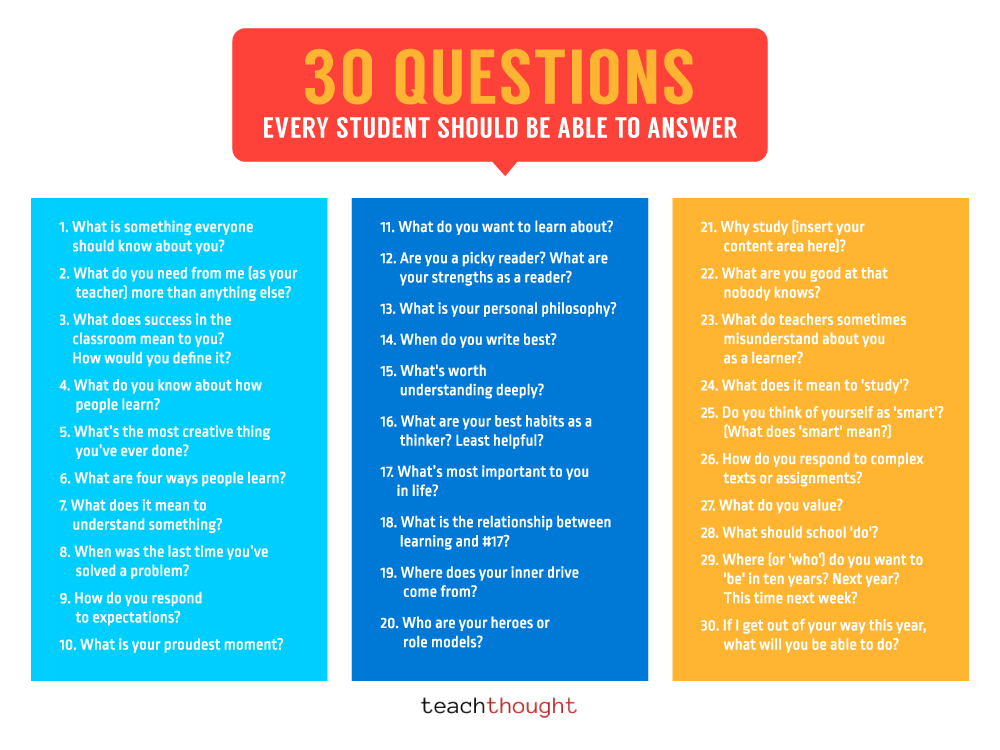
What Are The Kinds Of Questions That Help Students See Themselves As Learners?
by Terry Heick
These questions are more about the student than you, your classroom, or your education.
What every student should know starts with themselves and moves outwards to your content area: self-knowledge–> content knowledge.
As an educator, your job is to lead students to understanding, but student self-awareness and self-knowledge should precede that. These questions hit at a range of topics, but all revolve around that idea of a learner’s identity.
If it hasn’t already come, the first day of school is probably imminent for you, and these kinds of questions could come in handy there as well. Get to know you type stuff. But they can also help set the tone in your classroom that introspection is a must, awareness, and thinking are always-on, and self-knowledge is the ultimate goal of any system of learning.
Strategies for Implementation
These kinds of questions seem a bit…challenging, but if students can’t even begin to answer them, well, we have a problem don’t we? While some may not work at early primary/elementary levels, most are pretty flexible, and can be reworded as necessary by the teacher, or even the students themselves.
Based on some feedback we’ve gotten from our facebook community, here are a few tips to use this resource:
1. Jigsaw it
Break students into 4 groups, do the same to the questions, have students discuss each respective set as a group, then record their own answers after having a chance to discuss it a bit with others.
2. Choice
Have students choose to respond to the ones the want to respond to, and skip the ones they don’t
3. Personalize
If you have some kind of idea which students might need to answer which questions, assign them accordingly.
4. Use them as Journal or Blog Prompts
Each question can act as a writing prompt. In fact, used weekly, you’ve got almost an entire school year’s worth of prompts.
Then have the students take the entries and do some kind of artistic demonstration of the answers and share across social media or within a digital portfolio. You could also use them as weekly blog post themes for students, where all students answer same question, and students visit one another’s blogs and comment, etc.
5. Team-Building Games
Assign students questions to make sure all questions are answered by at least two students. Then have those students who answered matching questions meet, compare and contrast their responses, and share out.
6. Big Picture
Before anything else, ask students why questions like this are important.
7. Wing It
Just hand it to them and see how they respond, and take it from there. Drawing, debates, concept maps, Socratic discussions, etc.
30 Questions Every Student Should Be Able To Answer
1. What is something everyone should know about you?
2. What do you need from me (as your teacher) more than anything else?
3. What does success in the classroom mean to you? How would you define it?
4. What do you know about how people learn?
5. What’s the most creative thing you’ve ever done?
6. What are four ways people learn?
7. What does it mean to understand something?
8. When was the last time you’ve solved a problem?
9. How do you respond to expectations?
10. What is your proudest moment?
11. What do you want to learn about?
12. Are you a picky reader? What are your strengths as a reader?
13. What is your personal philosophy?
14. When do you write best?
15. What’s worth understanding deeply?
16. What are your best habits as a thinker? Least helpful?
17. What’s most important to you in life?
18. What is the relationship between learning and #17?
19. Where does your inner drive come from?
20. Who are your heroes or role models?
21. Why study (insert your content area here)?
22. What are you good at that nobody knows?
23. What do teachers sometimes misunderstand about you as a learner?
24. What does it mean to ‘study’?
25. Do you think of yourself as ‘smart’? (What does ‘smart’ mean?)
26. How do you respond to complex texts, media, tasks, projects, etc.? Is it different than how you respond to complexity in the ‘real world’?
27. What do you value (as a person, as a student, etc.)?
28. What should school ‘do’?
29. Where (or ‘who’) do you want to ‘be’ in ten years? Next year? This time next week?
30. If I get out of your way this year, what will you be able to do?
